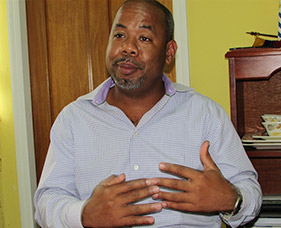
“Belize is one the best kept secrets, so I think it is time to drop the secret and say we are a beautiful country to come. We are peaceful and wonderful people, we speak English. We are close to all the major markets in USA”
TOPIC 1: ENERGY SECTOR
Belize currently expend approximately 7.5% of the GDP to purchase and import fossil fuel for our primary energy needs, except electricity generation, almost 60% of which comes from renewable energy sources. Private sector investment and public-private partnerships are critical pre requisites to reducing fossil fuel dependency. Main investment opportunities in this sector: energy efficiency and conservation and renewable energy technologies for the supply of clean energy to the national grid, each of which requires the applications of science and technology.
Being one of the most prestigious business men in Belize, could you please tell us what the private sector needs in order to be a greater player in the economy and to have a real growth for the next years?
The report done by the IDB regarding the National Sustainable Master Strategy 2023. In that strategy document we are hoping the 89% of our electricity come from renewable energy. Right now, we are using hydro and biomass from generation of the sugar cane factory and combined those produce about 60%. We have areas of solar, wind and wasted energy those are the areas we would like to see greater investments, as well, the biomass. When we look at the hydrological patterns of the full path of rainfall over the next 30 years we see that there is going to be problems. We already had crisis in the dry season with the hydro generation, when there is no rain you use less and less hydro, but we still have the demands so we have to buy expensive power from Mexico. The focus on biomass allows us to keep producing when we do not have the hydro. So the sector needs, largest investments in biomass, as well in renewable (solar and wind). Also, we have a tremendous market investment opportunity in Energy Efficiency, we have one of the highest energy efficiencies in the region and we can do there by looking at energy saving equipment for lighting, for cooling.
The Ministry´s goal is to strategically integrate energy, science and technology into national development planning and decision making and improve policy and regulatory framework for public utilities to improve service delivery. Could you please tell us a brief introduction of the history of the Ministry and how it is helping to boost the private sector?
This Ministry was established in March 2012. Public Utilities has always been part of the Ministry, as well as Geology and Petroleum Department, it existed before. Energy, Science and Technology are brand new. All of it was put together in 2012. Our goal is how we can have Energy, particularly renewable energy, energy efficiency and energy security a part of the decision making process to help boosting the economic growth because the cost, availability and reliability of energy are involved with everything that we do. Now we are not the most expensive in the region. Compared to the Caribbean region, we are more affordable or compared to Central America region, we are in the middle in terms of cost. We do know that we are not the most competitive. The prices have been coming down over the last years, a 12% decrease was announced, and so it came down from 20.5% to 16.5%. We do know that from foreign direct investors who were looking at high energy intensity projects that are one of the issues that make us incompetent.
We have been working and we have met with the private sector in the country to ask them what they need from the Government to make them more competitive. One of it is the cost of financing, even the largest banks do not have experience in dealing with energy efficiency, and it is relatively new for the country so the risk is high and unknown by the banks. The second one is inadequate policy frameworks meaning that our laws need to be revised and in some cases new legislation is needed to create the kind of environment that investors want. For example, exemption for energy equipment. The third one is a lack of skilled capacity, we have very few Belizeans trained or with knowhow. The cost of bringing outside experts can be high. The Ministry has been working in all these 3 concerns by looking at how the Government can access local financing. The second one is about the legislation that will allow for distributor regulation and provide fiscal incentives for private sector.
Regarding the transportation, our Ministry got involved because we have very close working relationship with the Korean Government. We applied for a grant from the Koreans to conduct a Transportation Master Plan Study so we coordinated it, but the implementation will be under the Ministry of Transport. It is the first time in history of the country that there is a National Transportation Master Plan and we were looking at the road networks and see how we can connect the ports and airports for the movement of people, commodities, goods. We currently do not have a deep water dock shipping port, we are limited by the depth at the port we have and it is privatized. The Government has identified a port in the South that has natural deep water that can become a critical port not just for the country, but for the region. Belize as a country is tiny, but when you look at the big picture we feel that it can become a hub. The idea was to see where the goods were coming from, where are the markets for exports of sugar, corn, petroleum and that is the best place. The Koreans were suggesting alternatives roads to save time and gas mileage and of course the transportation of people, in terms of public transportation system. It is all tied in because the energy sector is critical to the transportation sector. Of all the energy lost in Belize is in transportation, it is around 40%. This is why biomass and biofuel are important, we are currently working in a project with the Caribbean Community and the World Bank, and we are still in pilot, to see if we can use biofuel. We want to decrease our dependency of fuel, particularly the cost.
Could you please tell us key factors like number of employees, the budget 2015, and the growth of the company in the last year?
One of the challenges we had was when the Government established the Ministry in 2012 was during the time they were re-negotiating the super bonds and part of the commitment the Government had to set was that the Government expenditure for staffing will not increase. We never really got the complementary staff necessarily to have the things done. Nevertheless, we have been able to have almost everything done by getting experienced technical volunteers coming in and different projects through the Koreans, IDB, World Bank and EU.
In order to execute the different projects, from Government itself we have very little problematic funds. We have been able to raised money from different multilateral. We have projects through the World Bank about USD 8 million and ESD Caribbean about USD 1 million.
TOPIC 2: DIASPORA INITIATIVE
About one out of every three Belizeans now lives overseas. The majority have emigrated to US. We know that the government would like to implement the Diaspora Initiative, through which the Government of Belize is seeking to engage the Belizean Communities in the USA in a strategic, mutually beneficial partnership for the development of Belize. In addition to their major contribution to the Belizean economy in the form of remittances, they are also a potential source of investment capital, untapped market for Belizean goods and services, and an underutilized channel of technology and expertise.
rs.
Could you please tell us which are the strategies, the Government is implementing to engage Belizean Communities in the USA for a major growth of the economy?
When you look at the population of Belizean that live in USA in places like LA, NY, Chicago, New Orleans it is a massive number, there are numbers that actually say that there are more Belizeans living in the States than in Belize. They contribute significantly the local economy through their remittances. When the crisis hit in 2007 we felt it. A lot of Belizeans come back after they retired and want to live here. The whole area of energy efficiency where they can spend money is a chance to invest, in terms of the supplying availability of equipment they can buy. A big area is the energy service companies; where there is need to be investments with total solution companies and these type of companies do not currently exist. In terms of renewable energy, this at a different scale, it is expensive but we are right now working with the IDB again in a Flexibility Study to look at Belize becoming a part of the SIPAC. All countries in Central America, except Belize are connected and we can produce power and sell it. If that study confirms that we can join, the market for renewal energy in Belize become wide open because we can sell power at competitive price.
There is definitely an opportunity for people who want to look at investments on improving the use of energy, whether is electricity or fuel.
¿What is the vision of The Ministry for the next 5 years?
Everything in this Ministry is critical to our short and long terms in the country. We believe that having our National ICT Policy and so the Energy Strategy, we want to implement the recommendations on improving our energy efficiency, enhancing our national energy security. It is important getting young people to focus in areas that are needed for economic growth, areas like electrical engineers, automation engineers, computer engineers. The private sector tells us why they need so we need to ensure that the Government provides those needs through educational system. We feel like we are aligned with all the things we need so by 5 years we might start getting some results.
Could you please tell us your personal and professional background and how did you become the CEO of the Ministry.
I studied in USA, my degrees are in Conservation Biology and Ethnobotany. Then, both my PHD and Masters are in Ecology. I was in academia; I was the Director of the Environmental Science at Galen University in Belize. Later work for the Government, in 2012 I was asked by the Government to be the CEO, what in Latin American system is a Vice-Minister. In 1995, the country moved away from it was called “Permanent Secretary”, right now you are appointed by the Government.
What would be your final message to our readers, why they have to visit, invest and enjoy your lovely country?
Belize is one the best kept secrets, so I think it is time to drop the secret and say we are a beautiful country to come. We are peaceful and wonderful people, we speak English. We are close to all the major markets in USA. We have wonderful forest, the second largest barrier reef in the world; we have the highest number of Mayan ruins per mile square. We have an untapped potential in Energy, Science. Finally, the entire Government has been working very hard to be very transparent and accountable and to come out of those grey lists. As well, it is trying to create the best investment environment so we can have better economic growth for the coming years.


